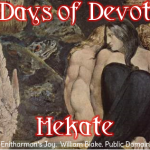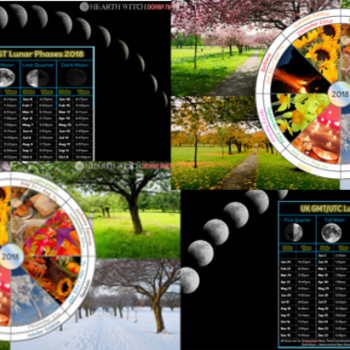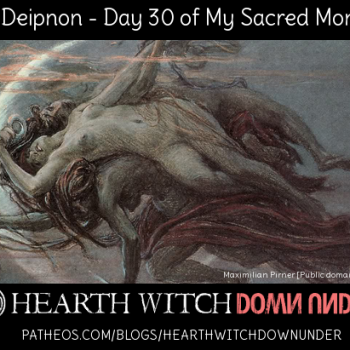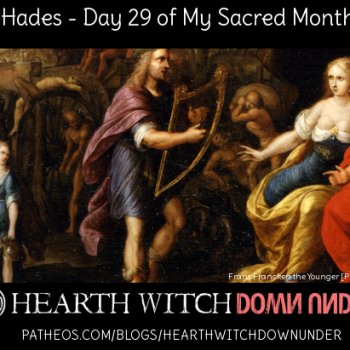This post is part of a blog challenge series, 30 Days of Devotion to Hekate. Day 11 and we are looking at festivals, days and times that are sacred to Hekate.
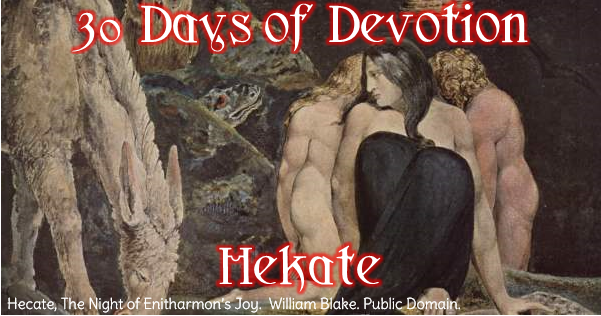
This is both easy and problematic at the same time. One of the difficulties in Reconstructionism and Revivalism of ancient religions is that sometimes things get a bit confused and the confusion becomes a misconception of history. Such is the case for some of Hekates festivals. There are some modern festivals that purport to be ancient festivals but they are not exactly when they should be, according to ancient times. Some people really hate these festivals, but many people observe them, and so they are festivals of Hekate, correct timing or not.
So yes, I will be including the modern festivals here. But we will begin with the ancient festivals.
Ancient Traditional Festivals
The Deipnon
Date: Every dark moon (astronomical new moon), when there is no sun light reflecting off the moon. When the moon rises at dawn and sets at dusk, and as such is not even in the sky at night. But if it were in the sky at night, it wouldn’t be visible to us anyway.
Why: The Deipnon, also known as Hekates Supper, is part of the Men Kata Theion or Sacred Month of ancient Hellenism. During the lunar month most days are sacred to specific deities or entities and we honour Them on that day – usually with a simple libation, hymn and incense. The final day of the lunar month was sacred to Hekate and is a little more elaborate than most of the other sacred days. It is when we honour Hekate as the Crossroads Goddess and leader of the dead, and as a night Goddess as well, but it is also the day we let go of the old, clean out the unwanted to make way for the new.
How: There are a few things we do on the Deipnon, but I am actually not going to get into it too much since I have already written about it – so you can go read that! I will simply say, we make an offering to Hekate in the night, left at the crossroads or an equivalent. We also clean the house, altar and shrines and finish those things that need to be finished before the new lunar month begins.
Noumenia
When: New Moon (when first sliver of a crescent can be seen in the sky. Day after the dark moon).
Why: Noumenia is the first day of the Men Kata Theion in honour of domestic or household deities, Hestia and Zeus Ktesios for the most part, and Selene as moon Goddess. Hekate is included on this day because She is both moon Goddess and domestic Goddess.
How: Basic offering of incense, hymn and libation to Her and the others (and any other domestic deities you want to honour). Begin new projects, write out plans for the month, fill in your calendar and other preparation things.
Kourotrophos
When: Multiple dates.
- 27 Gamelion, January to February. 2016, February 6th.
- 21 Hekatombaion, which is usually July, this year of 2016 it was 26th July.
- 16 Metageitnion, which is usually in August, this year, 2016 it is on August 18th.
Why: Sacrifice to Kourotrophos, Goddess of raising children. Hekate and Artemis hold the epithet of Kourotrophos, and thus are also honoured on these days. It is possible that Hekate and Artemis were not honoured on all of these dates in all places.*
How: Offerings and/or sacrifice to the aforementioned three Goddesses, hymns and libations and everything. Processions were apparently one aspect, of children and perhaps their mothers, probably pregnant women.
Bendideia
When: 19 Thargelion, May-ish. 2016, May 26th.
Why: I only sometimes see this named as Hekates festival. It is in honour of Bendis, who became conflated with Artemis and Hekate. The festival rites do seem supportive of Hekate either way. Not much is know about the Goddess Bendis or Her festival, especially the original Thracian version, but the Athenian version has some information.
How: Long procession during the day, feasting at night and horse racing with lit torches (horses and torches does equate with Hekate). It was an all night festival, possibly all day and then night.
Modern Annual Festivals
January 31st
A day to honour Hekate. No idea why or what it involves “traditionally” other than, honour Hekate!
May Full Moon – Rite of Her Sacred Fires
A full moon ritual in honour of Hekate Phosphorous, developed by Sorita D’Este for the Covenant of Hekate and still relatively new, less than a decade old – but is exceedingly popular. This is a specific ritual, and you can find all the relevant information on the CoH website – a complete outline, with materials needed, hymns included and everything. It can be done day or night, inside or outside, on the full moon itself or the day before or after.
August 13th – Hekates Night and/or Hekatesia
Hekates Night is a festival of propitiation, where we ask Hekate to not send nasty storms to us. Now, Hekate isn’t really a storm Goddess for the most part – but I can find precedence for this! In Samothrace, the Zerinthian cave is where they sacrificed dogs to Hekate and the Kabeiroi, in the hopes that it might save them from terror and storms.
So we are meant to leave an offering at the crossroads for Hekate and ask Her to keep away damaging storms. Though personally, with the Samothrace connection, one might think caves would be more appropriate.
Most think the date for this comes from the Roman Nemoralia festival, which is in honour of Diana who is conflated with the Greek Artemis, and thus with Hekate. This festival had torch processions and was a time to ask for healing, but had nothing to do with storms and didn’t actually include Hekate, from what I can tell. It is also possible the date is a confusion regarding one of the above Kourotrophos festivals, which have movable dates but one usually falls in August.
Hekatesia is a different festival, that I actually can’t find all that much about. But this is the date given in the Starry Bull calendar, and the August full moon is one of the dates set out as possible according to Neokoroi. That Neokoroi link contains a ritual outline if you’re interested – you may like to use it for this weekend.
October 31st – Halloween or Samhain
For Halloween and Samhain, well, I needn’t explain the obvious conflation here, need I? She is an underworld Goddess and leads the host of the dead, thus She is a Goddess to be honoured for festivals of the dead. It is, of course, not a traditional or historical festival for Hekate (She isn’t Celtic after all). Note: In Australia and the southern hemisphere, Samhain is on April 31st and thus would be Hekates night as well.
November 16th – Hekates Night
A thoroughly modern festival, apparently it has something to do with Hekate being part of the Wild Hunt…. I don’t even know! I only heard of this one this year! Let’s not discuss my wilful ignorance.
November 30th – Hekate of the Crossroads
Another modern festival, for honouring Hekate of the Crossroads. I suppose one would make an offering at the crossroads and do things that evoke the idea of Hekate as the Goddess of the crossroads. Things to do with transition and change seem a likely choice.
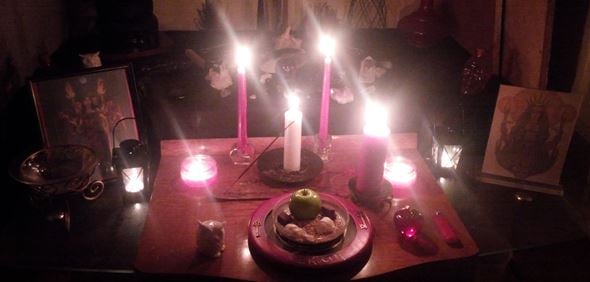
As we can see the modern festivals are, for the most part, a bit empty and missing information. Other than the Rite of Her Sacred Fires, and Samhain of course, the others listed don’t really give us much in the way of ideas on how to celebrate the festivals. This is the problem with just grabbing a date and giving it to a deity without some thought into what that date should mean and be about. Hekate has so many aspects to Her, that saying a day is about Her really doesn’t tell us much. Is it a light or dark festival? Is it a life or death festival? Is it magic or mundane?
So, if you’re going to create your own festival – make sure you create some details for it as well.
Others
Full Moons
Modern again, but many people associate every full moon with Hekate. As a lunar Goddess this makes sense, but personally I would say the full moon is the night for honouring all lunar deities of your particular tradition, not only Hekate.
Night Time
Hekate is a night Goddess which means that night itself could be considered sacred to Her, especially dark moonless nights that are lit by starlight (bringing Her mother Asteria into it as well).
Dusk and Dawn
This is a bit of UPG. As a Goddess of transitions (crossroads, change etc), a Goddess of Night and the Goddess who brings the light I think it stands to reason that dawn and dusk might be sacred times to Her. They are both transitional times, but not only this, dusk is the transition into darkness and dawn is what brings the light.
30 Days of Deity Devotion
1 – A basic introduction of the deity
2 – How did you become first aware of this deity?
3 – Symbols and icons of this deity
4 – A favourite myth or myths of this deity
5 – Members of the family – genealogical connections
6 – Other related deities and entities associated with this deity
7 – Names and epithets
8 – Variations on this deity (aspects, regional forms, etc.)
9 – Common mistakes and worst misconceptions about this deity
10 – Offerings – historical and UPG
11 – Festivals, days, and times sacred to this deity
12 – Places associated with this deity and their worship
13 – What modern cultural issues are closest to this deity’s heart?
14 – Has worship of this deity changed in modern times?
15 – Any mundane practices that are associated with this deity?
16 – How do you think this deity represents the values of their pantheon and cultural origins?
17 – How does this deity relate to other gods and other pantheons?
18 – How does this deity stand in terms of gender and sexuality? (historical and/or UPG)
19 – What quality or qualities of this god do you most admire? And find the most troubling?
20 & 21 – Art and music that reminds you of this deity
22 – A quote, a poem, or piece of writing that you think this deity resonates strongly with
23 – Your own composition – a piece of writing about or for this deity
24 & 25 – A time when this deity has helped you, and refused to help
26 – How has your relationship with this deity changed over time?
28 – Something you wish you knew about this deity but don’t currently
29 – Any interesting or unusual UPG to share?
30 – Any suggestions for others just starting to learn about this deity?

